Keeping Occupied
Who are these people and what do they want?
As Occupy Eugene protester Chris Calef says, “no one is really authorized to speak for the Occupy movement.” Occupy Eugene, like Occupy Portland and countless protests across the country, is ruled by consensus. The diversity of people and opinions of the 99 percent at Occupy Eugene and at Occupations, from the small 400-person town of Mosier in the Columbia Gorge to the mother of all Occupations on Wall Street, are the movement’s strength. According to one of Occupy Eugene’s organizers, Katie Dee, “We are a culture of complete acceptance here, and we make decisions by consensus, which means that 90 percent of us have to agree with a decision before it’s made, which means that there’s no leadership. It means that leaders can’t hijack what it is that we’re doing. We’re not following a leader blindly, which is what this country has been doing all along.”
The mainstream media portrayed Occupy Wall Street (OWS), now going into its second month, as lacking direction at first. But it’s become clear that Occupiers are tired of an economy and elections controlled by a small minority of the nation — the 1 percent.
Occupy Eugene has settled into its camp at Washington-Jefferson Park, and for all intents and purposes, it looks like it’s here for the long haul. EW talked to Occupiers, business people and politicians to find out just who OWS is and what they want. And what everyone wants to know is: Where is this energy going to go? Can the 99 percent change the nation? We hope so. For updates, events, marches and protests go to occupyeugene.com, or just drop by the Occupation between 1st and 7th avenues and Washington and Jefferson streets, under the I-105 overpass.
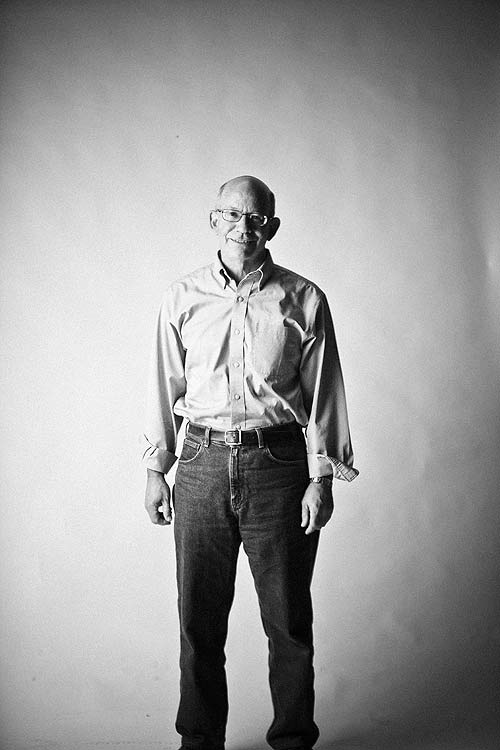
photo by todd cooper
Peter DeFazio
U.S. Congressman, Oregon’s 4th District
What do you think Occupy Eugene and the Occupy movement represent politically and socially?
Clearly tens of millions of people in this county are hurting. They are out of work; they are worried about the security of their jobs; they’re worried about their kids, their kids’ future, keeping their house. There’s so much pain. But the way the mass media works, I think a lot of people are half convinced they are sort of unique; they’re a little ashamed, or it’s their problem. And I think what the OWS group has done with the 99 percent is to let people know the problems they are experiencing are not their fault, that they are very broadly spread through society; in fact they are systemic and have been building for more than a quarter of a century.
They made it OK for all these people to come out and say, “Yeah I’m hurting, too, and we need to do something about this.” So I think they are really empowering a much larger group of people.
Do you think the Occupy movement can effect change the way the Tea Party did?
If you think of mass movements of the past, they didn’t necessarily start out as political movements — populism in the late 1800s, or the civil rights movement or the antiwar movement. They were pretty diffuse to begin with but ultimately turned into a vehicle for dramatic change at national level. I’m hopeful that the OWS folks will provide the same kind of catalyst here. There were a lot of people who affiliated with the Tea Party movement who were angry, folks who did not necessarily share what’s currently being touted as the far right agenda of the Tea Party. They came because they were angry at what happened on Wall Street and angry at what was happening to them. This was the only group out there saying this is rotten and we ought to do something about it. This (OWS) gives those people somewhere else to go with expressing a different set of values. I don’t see it yet as a focused political movement, but it may well grow into that.
Since I reintroduced the speculator tax we’ve been trying to communicate it out there to folks as one of a number of things that the movement could take up as a cause.
What does the Occupy movement need to do in order to create political and economic change?
I don’t know what came first, whether it was the Occupy movement or Move Your Money on Nov. 5, but I think they are now working together, sort of combined. So we’ve already seen an impact. I mean, they backed down — the Move Your Money folks, the discontent customers, and the Wall Street folks, they backed down Bank of America on price gouging people on their debit cards! That’s a nice little start, but it has to get bigger than that in terms of systemic reform and putting Wall Street in its place in society and turning all our efforts toward rebuilding the real economy to benefit the 99 percent of the people in this country. There’s tremendous potential there. It’s going to be step-by-step, and maybe at some point it becomes a larger more ambitious agenda.
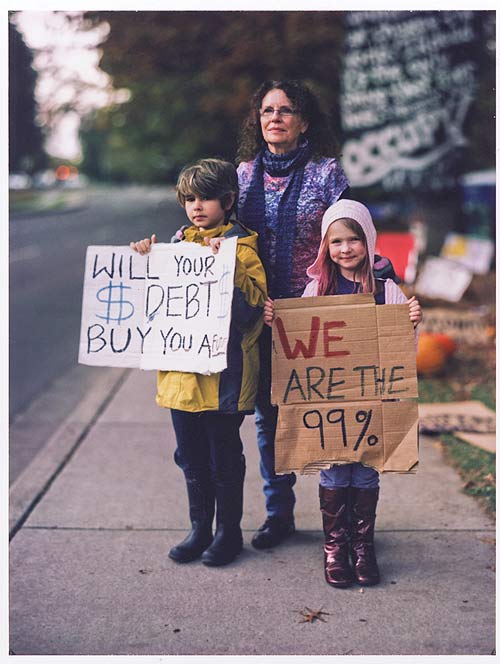
Pam Garrison
Occupy Eugene organizer; nurse
What do Occupy Eugene and the Occupy movement represent to you?
It represents a people’s movement standing up and saying that this country is not going in a direction that’s helpful for the people, and I think it’s generally about economics but it’s about a lot of other things: It’s about classism; it’s about ageism; it’s about sexism; it’s about gender identity issues.
I was around in the ‘60s. I was against the Vietnam War; my boyfriend from high school was killed in it, and so I started doing all this stuff, and we thought we had accomplished so much. We fought so hard for feminism and all this stuff and then gradually throughout the years my generation became the yuppies and did all this stuff, and we started seeing the pendulum swing all the way back and everything’s falling apart. What I see is where the pendulum stops swinging, and we’re going to start going back, and I think it’s necessary. For me, I’m just so excited that the younger generation is here, and that’s why I’m trying to help. I remember when I was that age, and we had older people help I felt really good about that, so I just wanted to be able to do that for this generation.
What is your role and why did you become directly involved?
I work in the medical tent and in the sobriety tent and I’m also the liaison between medical and peacekeepers, because I’m an RN. I’ve been working with most of the peacekeepers here for about 10 years since the Iraq War started; we’ve done a lot of protests; we’ve been arrested together. It’s a really strong group of my generation. We started hearing about this and we started meeting and asking as a group of the elder activists what we could do, and we started going to the general assemblies and we each found our way to fit in.
What do you hope the Occupy movement will change?
I think I want it change the attitude of apathy. People think they can’t help it, the dishonesty, the way people vote. We’ve been voting in people who aren’t what we thought they were, and I believe that Barack Obama is one of those. I think he might have been that person but when he got in office he couldn’t be, because there’s just so much corruption. And I think it’s just really important for us to try through the system and outside of the system — we can’t do it all in the system and that’s the mistake we’ve been making within the Iraq War. It was too much inside the system, and it’s just been continuous killing. And now I think they’re talking about going to Iran and I’m thinking “This has got to stop.” I also do it for my grandchildren who are little children and I want them to have more than this.
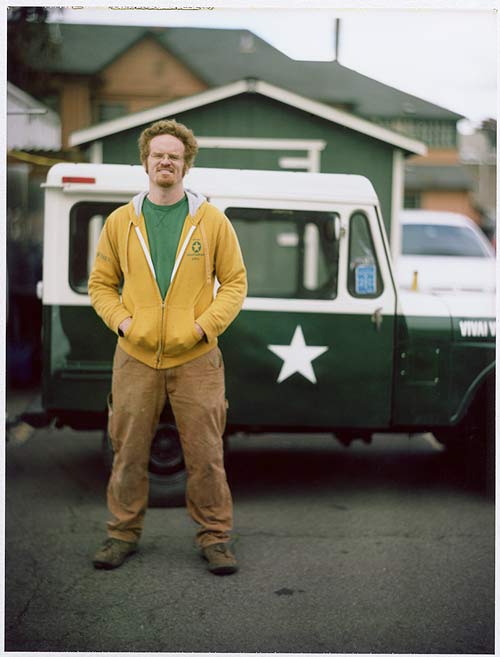
Dave Waggenheim
Viva Vegetarian Grill; food donor to Occupy Eugene protests
What do Occupy Eugene and the Occupy movement represent to you?
Specifically as a local business owner and part of the community, it’s just a really good expression of ideas, the thoughts of what’s kind of going on in our society right now and with politics and the financial side of things. As a local, small business I think I can relate 100 percent with what all those posters and sayings are saying. When you compare a small business to a large corporate behemoth there’s a lot of imbalance. So in a way you can kind of project that up to the working class man, to the movers and shakers on Wall Street getting paid millions on the backs of normal taxpayers and hardcore workers. It’s a great movement. I support it. As someone who’s busy I want to support it any way I can.
Why did you get involved directly, and what are you doing or have you done?
I thought it seemed to be a movement ramping up, and I wanted to find a way to contribute, either time or product, to kind of show the people out there that they were supported by all kinds of people in the community. I don’t have a lot of time to donate so I figured I’d just donate food, and I thought it translates really well. So, for two hours we were giving out food nonstop until we were all out. We gave away about 200 sandwiches. Everyone was real psyched.
What do you hope Occupy Eugene will change?
I hope that it will send a message to everybody in the Eugene community that if there are things that we’re unhappy with, we can mobilize and come together as a solid voice and work to change things. It may not happen immediately or overnight, but as this movement attracted a lot of attention and continues to attract a lot of attention I think the main message is that people are not content and they want to speak out instead of just being silent and just taking it. If a few things can change as a result, I’d call it a huge success. Or even if it gives people more confidence to speak out the next time we go to war, or some crazy thing that’s just ridiculous, people will be like, “I remember when all these people camped out and created a scene, we can do it again.” I hope that’s the message it sends, that we can create a scene and start a conversation.
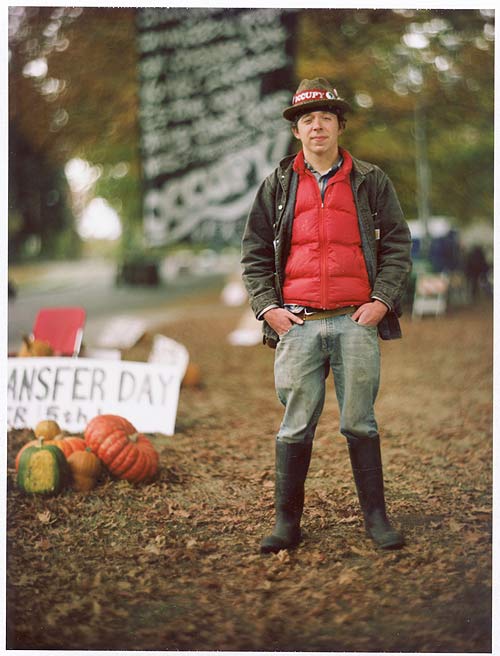
Phillip Crowe
Occupier; poet
What do Occupy Eugene and the Occupy movement represent to you?
To me — and I can only reiterate that I can only speak for myself and not for the whole occupation — Occupy Eugene and the whole Occupy movement represents a shining example of taking into your own control our own governance and being a shining example of our democracy in practice.
Why did you get involved directly and what are you doing?
I saw a system of mass inequality. There are a few key points that I see as being my key issues. One of them is the forgiveness of student loan debt. We have an extremely inequitable university and college system, and in order for democracy to work, we should have free education as a human right so that people can plug in where they have the passion and also have the knowledge and skill sets to do so. Our current education system creates wage slaves, people who are in debt $40,000, $50,000 or more sometimes and often given jobs that cannot pay that debt back. So they don’t have the same leg-up on life as those who go to school and have it paid for them.
Secondly, I am definitely interested in ending corporate personhood. I’ve been working with We the People–Eugene on this topic. Right now corporations have the same free speech rights as individuals, which seems ludicrous to me because they have very limited liability and their general motive is not a holistic one, it’s based upon making profit.
Thirdly, I’d like to see a fourth branch of the government to serve as the voice of the people, as a check-balance for the other branches of the government — judicial, legislative and executive. My demands in general are for a more equitable society, one in which people can actually have the American dream.
I have a few different roles here but my key issue is morale. I am a poet and spoken word artist and I lend my abilities in terms of helping keep morale up. I also helped organize shows here to help keep morale up.
What do you hope the Occupy movement will change?
What I hope to see change is apathy. What I am noticing is that in the ’60s, the college students spearheaded a movement. Here there have been some students who have come down here and showed interest, and it’s not just the students. In general we have a general feeling of apathy.
The idea is to go from the I, you, he, she or it to the we. To have social responsibility.
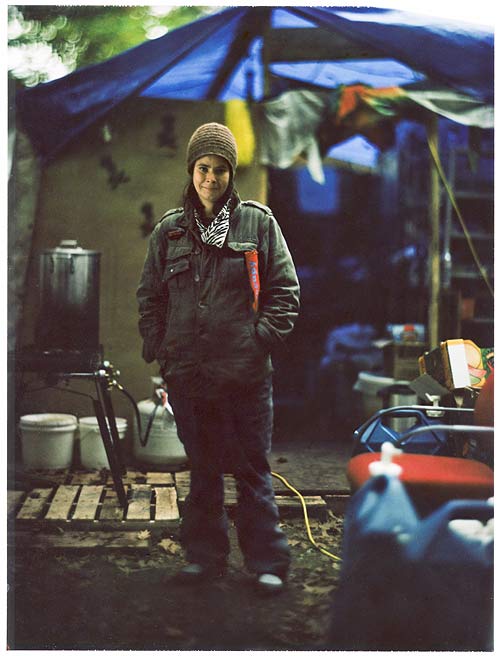
Danielle
Occupier; unemployed and homeless
What do Occupy Eugene and the Occupy movement represent to you?
To me, the occupation represents, specifically here in Eugene, people being mad as hell.
Why did you get involved directly and what are you doing?
I got involved because I am homeless, and it is illegal to camp out here, and I have multiple camping tickets. It is illegal to camp in different parts of Eugene. So technically if you’re homeless, you cannot sleep anywhere. And if you do sleep somewhere you’re risking getting either arrested or fined or ticketed. And all that stuff clutters up the courts. I got involved to stand up for basic human rights; we have the right to live. You know, this was supposed to be a free country, and it’s really not.
Specifically, out here I am working in the kitchen. I know what it’s like not to eat for weeks and to have to find your food out of a garbage can and then go in and get sick from that food. You have no resources. I’m out here to feed people, keep people happy and help people. Everyone has to eat, and food brings people together.
What do you hope the Occupy movement will change?
For me personally I hope it will change the way that people view people, because we need to be human and humane humans. I think everyone is so busy with their lives that they forget that we really don’t need as much as we are taking in. I remember having so much stuff, and now that I have nothing I realize I could have given so much stuff to people who really needed it. I think we really need to focus on the economic situation. There are no jobs out there. I’m hoping this will create a stir in the big corporate companies and help them realize that they need to make a change. If they don’t make a change, people are going to be mad as hell. I hope — any kind of change would be great, from wherever it comes from. That’s the reason people are here.
Katie Dee
Occupy Eugene organizer; works multiple part-time jobs
What do Occupy Eugene and the Occupy movement represent to you?
The movement represents to me the normal regular people in the middle class and lower, the 99 percent, those of us who make less than $1.3 million a year; it is our efforts to make visible the struggles that we face every single day. We don’t really have a voice in our government any more because Congress has been bought and paid for, and the president has also received lots of donations from the financial sector, and he doesn’t have a whole lot of choice as to what he can do. We have a really long list of things that we believe in and it’s a complicated message for the corporate media. There’s just so much wrong with the world right now, so it’s really hard to narrow it down into a sound bite that goes along with the consumer media culture. It represents the alternative to consumer culture that we are all sort of mesmerized by right now. …
People like myself — I have type I diabetes, no fault of my own, but because of that I have really expensive health expenses and medicine that I need to stay alive, and it’s not provided for me; I need to come up with the money to do it on my own — and people who are out there with chronic conditions — it’s really hard for us to find insurance. I have to get it through an employer, and if I lost my job I wouldn’t have insurance. I would quickly go bankrupt and probably end up on the streets. That’s just not fair.
The 1 percent needs to be taxed so that we can pay for these things. We need to stop all of the wars because that’s what we spend most of our budget on, and it’s complete bullshit.
What is your role and why did you become directly involved?
I am on the communications committee and the sobriety support committee. After about four years of college I ended up as an administration assistant at a big corporate-like nonprofit in San Francisco, and I decided to go back to school for my master’s degree, and now I have four part-time jobs which do not add up to a 40-hour-a-week job. After eight months of paying for Cobra health insurance for $300 a month I finally got it from my employer, and if I lose that job, I’m homeless. I live paycheck to paycheck and I’m out of money by the 15th of every month. I get paid on the first of every month and two weeks later I’m out of money to buy food, so I go to the food pantry. I have four jobs! It’s ridiculous. I’m following all the rules, I have student loans because I couldn’t live on the $800 a month I earned as a GTF (graduate teaching fellow) and I’m just really fed up and I want to do something about it.
What do you hope the Occupy movement will change?
I hope that it creates visibility that this type of living and this type of deliberate action is possible, and right now we’re showing the rest of the folks at home who are still in front of the television and zonked out because they’re tired of working all the time. We’re showing them that it’s possible to live differently and make decisions differently and make an impact on how this country is run and the world is run, which needs to happen because we’re pounding our species into the ground; we’re destroying the earth and we don’t have much time left.
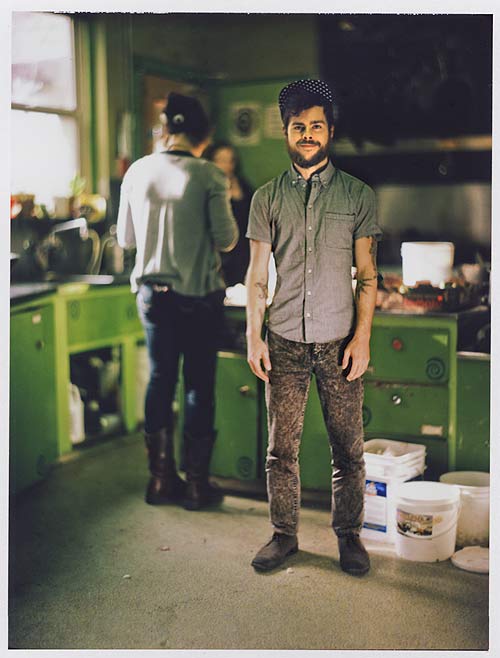
Joe McFadden
Food Not Bombs
What do Occupy Eugene and the Occupy movement represent to you?
As social activists the Occupy movement is an awesome example of people getting together to express their disgust and outrage with a system that is not simply corrupt but is corruption itself. It’s great to see that people are becoming radicalized because it fails to meet basic needs of many individuals. The solidarity and momentum within the movement has been impressive. The fact so much can be done with so few resources only reinforces the idea that not only is everyone entitled to decent food, shelter, a living and so forth but that it can be done with a lot of heart and some sweat.
Why did you get involved directly, and what are you doing or have you done?
Some of us have spent time abroad and/or in other U.S. cities that have had movements of resistance to the effects of the economic collapse. Food Not Bombs’ mission of politically addressing the root cause of hunger got many of us directly involved with Occupy Eugene. It made sense since many of the people we feed are strong supporters and participants in Occupy. We served its first meal after the Oct. 15 march (before the on-site kitchen was set up). We continue to show our support in providing them with food donations and attending rallies and meetings.
What do you hope Occupy Eugene will change?
We can only hope that Occupy Eugene will increase awareness, solidarity and ideally attain better conditions for people who have been living on the margins of society, some since well before this economic downturn. We must recognize our beautiful and unique differences but also realize our common struggle. Occupy Eugene addresses local concerns while still embodying the basic elements of Occupy Wall Street. So far it’s been useful in reducing crime related to some of the street families in town. There’s now a street family coalition between families that before were feuding. Since the city itself currently doesn’t really have the infrastructure to deal with homelessness, let’s not simply hope, but push for new liberated spaces.
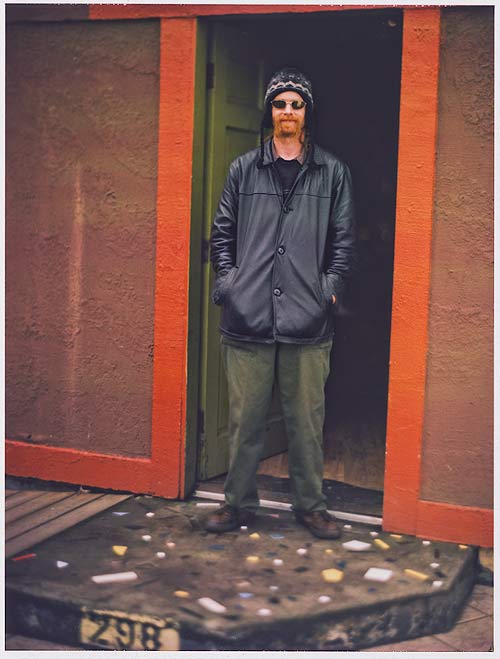
Josh Henrikson
The Last Stand Coffee Co.
What do Occupy Eugene and the Occupy movement represent to you?
The Occupy movement and myself are merely looking for justice in the U.S. economic system, fairness in medical care, food and education for the whole, not just the rich and connected. The future has to provide change and justice.
Why did you get involved directly, and what are you doing or have you done to support it?
I am currently helping to support Occupy by providing logistical support and motivation for the peaceful protesters. I am working to deliver coffee and morale to the Occupy site whenever possible, speaking with the occupiers and learning of the concerns and directives that are most crucial to the success of the revolution.
What do you hope Occupy Eugene will change?
The Occupy movement is here to begin that change to really start the stones rolling towards justice.
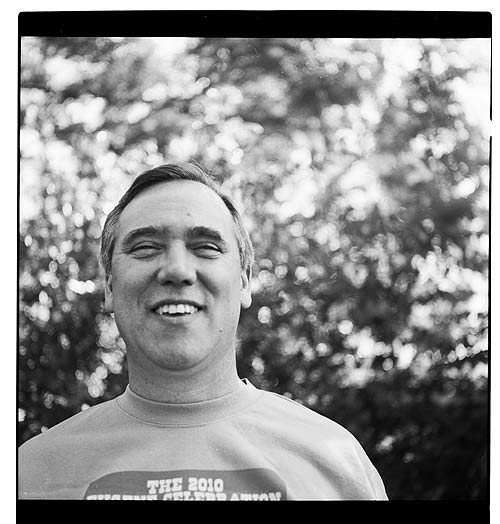
Jeff Merkley
U.S. senator, Oregon
What do you think Occupy Eugene and the Occupy movement represent politically and socially?
It represents the enormous frustration of working people. Basically, over the last three and a half decades from the time I got out of high school, wages — inflation adjusted — have gone flat and in the last decade they’ve gone down. You see health care rising; you see tuition is rising; you see real wages dropping, and people realize this is not working for their own family, this is not working for our nation and we’ve got to do something about it.
Do you think the Occupy movement can effect change the way the Tea Party did?
Absolutely. Folks are paying attention to this intense emotional outpouring that says “We have got to do something to change the dynamics of our current economy.”
It’s in every Senate caucus meeting, in conversations I’m having with my colleagues. Folks have responded from all over the country. I talked to someone today from Roseburg, and there’s a little Occupy Roseburg gathering that I didn’t know about. All over the country people are saying, “We want to be part of this. We’ve been sitting in our living rooms, frustrated, sitting at our kitchen tables, frustrated. And now we’re going to come out and join each other and make much more public our collective sense that things have to change.” It’s affected the conversation a lot already.
For years I have been quoting statistics about the working people failing to get ahead and share in great productivity of the nation. Our enormous increase in national wealth has not been shared with those who are creating that wealth. Now I hear colleagues quoting statistics about the top quintile, the bottom quintile and the top 21 percent. There’s been a huge direction in people coming up to speed about this challenge and brainstorming. It’s been very helpful to have folks expressing themselves.
What does the Occupy movement need to do in order to create political and economic change?
I think that there are two levels here: One is the sense of identifying the problem, and I think the movement has dramatized and amplified that conversation.
Then there is the question of what are the specific things that we do to change this? I think at some point it would be helpful to have the movement engage in the dialogue with a series of proposals that they can get behind and help carry the conversation through the next election year, I’m not sure exactly how that would unfold, but it could be helpful to direct the energy into the additional sphere of ways we can help strengthen the economy for working people.
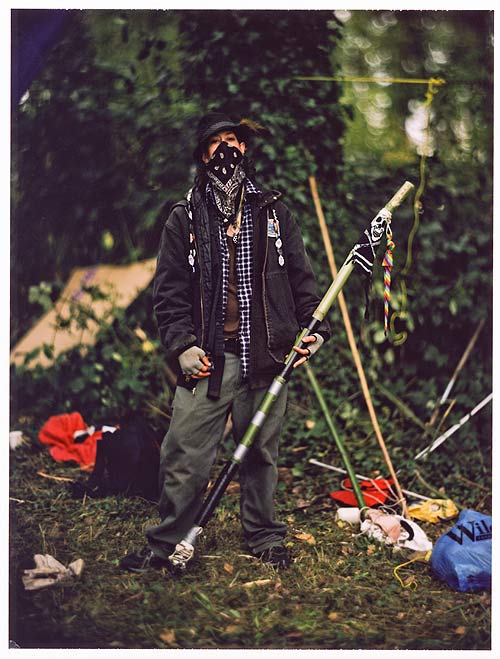
Sparrow
Occupier; Occupy Eugene organizer; unemployed and homeless
What do Occupy Eugene and the Occupy movement represent to you?
It represents the whole group of united working poor and homeless, and those who will eventually be homeless because of how the economy is going. That’s what it represents to me, and I feel a lot of people in the Occupy movement feel that way.
Why did you get involved directly and what are you doing?
I got involved because I’ve felt this coming for a long time. This isn’t just a political movement. I feel people are waking up. In a way this is a mental evolution. I got involved because I can’t stand what’s going on. Me and four others who live on the street are trying to unite the local street families and unite them with the Occupy movement.
What do you hope the Occupy movement will change?
I personally hope to see another kind of community come from this, one that doesn’t have a hierarchy system based on monetary means. We don’t pay attention to things anymore, and it’s made us lose track of what really matters.
Rob Miller,
Occupier, wildcrafter
What do Occupy Eugene and the Occupy movement represent to you?
This is just me; this is what I see. I can’t speak for everyone. It’s the beginning of a tidal wave of change — a tidal wave of change. I see people saying the system is the problem; we can’t work within the system anymore. We need to bring the change.
Why did you get involved directly and what are you doing?
What got me out the door was an inner feeling, you know? Just knowing that this is the biggest chance I will see in my lifetime to enact major change. We were so dead as a culture before this. We were just dead.
I’m a day-occupier. I’ve been on the collective vision committee. I also organize “speak from the heart” circles, so people can really get out there what they are feeling and what is important.
What do you hope it will change?
I want to see an evolution to the next step of humanity. Really, I think that is what we are headed towards.
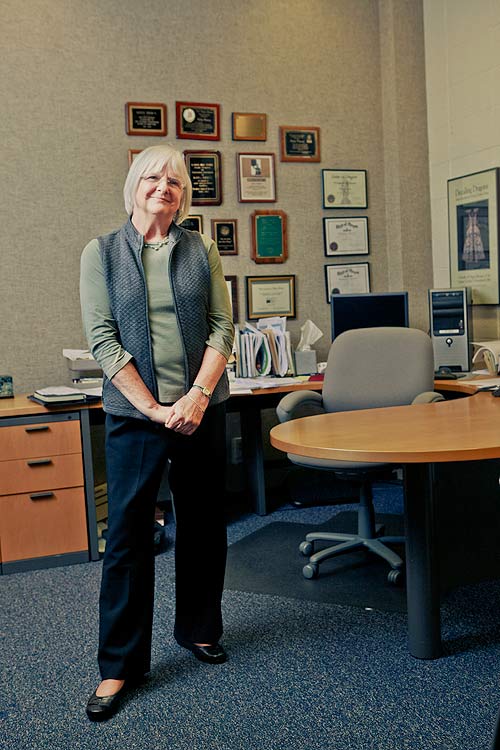
Kitty Piercy
Eugene Mayor
What do you think Occupy Eugene and the Occupy movement represent politically and socially?
Occupy Eugene is part of a national movement to express frustration with the inequities of this country as so many face unemployment or underemployment; loss of homes; access to health care; underfunded schools and crowded classrooms; less access to higher education and skyrocketing tuition; and a federal government seemingly unable or unwilling to address these needs. Occupy Eugene is a broad band of people who have come together to support the national Occupy effort across this country and to create a huge voice for the need for change. This is not a voice for getting government out of the way, but a voice for insisting that we must have the kind of government that truly supports democracy and the economic and social health of our families and our kids and their futures. This is a movement that recognizes that our government should function for us all and not just a chosen few. It recognizes that we are a nation in crisis.
Do you think the Occupy movement can effect change the way the Tea Party did? If so, then what does the Occupy movement need to do in order to create political and economic change?
I think Occupy Eugene has to remain focused on the needs of the 99 percent, the everyday hard-working people, and the immense stresses they are under. Occupy Eugene, along with Occupiers across this country, insists that we return to being a land of opportunity for all, where we can rightly expect that with hard work we can each raise our families, house, feed and educate them and live in a strong great nation that we have pride in.
Perry Graham
Occupy Eugene organizer; UO grad student in Dispute and Conflict Resolution; intern for National Policy Consensus Center
What do Occupy Eugene and the Occupy movement represent to you?
Well, I think that Occupy sort of really represents a venue for people to really have their voices be heard. It’s just been a long time since people really have felt like government has responded to their needs. So by getting together, we have hope that our voices can be heard louder than just individual voices. I think that the Occupy movement is also about learning and empowerment. We are learning new ways to relate to people, particularly from different social groups. We are finding the courage and the power to take our fate into our own hands and everyone’s hands and make a change for the better.
Do you think the Occupy movement can affect change the way the Tea Party has?
Yes, I definitely think so. And I think that probably the most important change that right now that I would like to see in politics that the Occupy movement can do is empower and embolden a number of our political leaders to fight for what the movement is asking for — what the 99 percent is asking for, what the 99 percent need, really. If that can happen, I think it can really change the frame of the discussion and change is more progress coming from there.
What does the Occupy movement need to do in order to create political and economic change?
Well, in terms of economic change, we are already exerting our power on that. This morning there was a story in Democracy Now that Bank of America has just canceled their debit card fee in response to 21,000 of their customers making pledges to close their accounts and over 153,000 signatures collected. …
Beyond that, I think that we need to keep in mind that occupying is just a tactic. It is sort of just a way for us to exercise our First Amendment rights and stand in solidarity with each other and show just how much support this movement has. But moving forward, especially as the election gets closer, we will need to find a way to exert our collective political power. There has been a little bit of talk I’ve heard about the Occupy movement possibly running a political candidate in the primaries. So, I’m really not sure and it will just be interesting to see how the movement evolves. … The more support that we have the stronger we can be as a movement. And the more strength that we have the more we can be heard and accomplish as a movement.
Chris Calef
Occupy Eugene volunteer, vision commission; videogame industry
What do Occupy Eugene and the Occupy movement represent to you?
To me, the Occupy movement and Occupy Eugene represent the complete rejection of the status quo in American (and by extension, global) politics. By status quo, I mean specifically the undue amount of influence exerted by private wealth on the U.S. and most other political systems. There are a myriad of issues on the minds of all Occupiers, and opinions vary widely with regard to which are most important — as the former chair of the Collective Visioning Committee, I can attest to this variation. However, I believe the primary overarching concern is the fact that the system itself is broken, and nothing else can be effectively addressed until campaign finance, lobbyists, revolving doors and every other form of legalized bribery and corruption have been eliminated.
Do you think the Occupy movement can effect change the way the Tea Party did?
I believe the Occupy movement is already effecting change, but I sincerely hope it does not do it the way the Tea Party did. We are already making changes on the ground, in the retreat of the big banks from their recent round of debit card fees, etc., as well as in the constitutional amendment just proposed by some Democrats to reverse the Citizens United ruling. However, the Tea Party allowed itself to be co-opted by the Republican Party, and in so doing turned itself into nothing more than a mouthpiece for big business. I hope that the Occupy movement can remain strong in refusing to support any political candidates — at least until the systemic issues have been resolved. I support fixing these systemic problems by means of constitutional amendments, ballot measures, etc. — not by supporting candidates.
What does the Occupy movement need to do in order to create political and economic change?
I believe the Occupy movement needs to stay clear of divisive partisan issues and instead focus on common systemic problems like wealth disparity and political corruption. This is very difficult for me to say, because I care deeply about many partisan issues, but in order to achieve success within a reasonable time frame, I believe we need to pare down our message to only the most critical bits, which are the fact that our government is literally owned by the 1 percent — or the 0.01 percent, more likely — and the fact that it is being run for their interests instead of for the common good. For now, the biggest thing we need to do is outreach, outreach, outreach to communicate our message to everyone who is affected by the current crisis but is not yet involved with the struggle. When we literally represent the will of the 99 percent, then we will be successful no matter what specific tactics we choose.
Jamil Jonna
Occupy organizer; UO grad student
What do Occupy Eugene and the Occupy movement represent to you?
A lot of things, but most centrally it represents an innovative or a new phase of social movements in the U.S. The significance is not the occupation for me, because occupation itself is not a new tactic, but it is occupation that’s anti-system but mostly about class and inequality. In that sense occupation means to me something new and different and important.
What is your role and why did you become directly involved?
My role initially was basic organizer. I have web design skills. I created lists, worked on internal organization, did legal research, and working with city officials. Also I did communications. I got involve because of what I think Occupy represents. To me it’s a very necessary movement in this country about widespread social change.
What do you hope the Occupy movement will change?
I think of it in parts. Initially I would hope it is able to subsist for some time significant period of time of resistance. I think people need time to come to understand each other and talk to each other again, through the media and academics and schools. In this country we’re so individualistic and separated, to be able to get out and see each other and share different points of view is important. It’s unique here in this country that we’re so incapable of having that kind of dialogue.
Emilia Rorden
Occupy Eugene supporter; volunteer with Healthcare for All
What do Occupy Eugene and the Occupy movement represent to you?
I think the Occupy movement represents the much-needed insistence by the voting public on being involved in how policy is made in this country. It’s giving people who have spent their lives feeling powerless and insignificant a voice. I attended the City Council meeting on Oct. 24 when they voted an exemption to the camping ban for Alton Baker Park, where Occupy Eugene was camped at the time, and a woman who identified herself as homeless thanked the Occupy movement for allowing her to be a resource to her community. I thought that was fantastic. I’m usually working when many of the Occupy events are taking place, and that’s kind of bummed me out, because it’s hard to participate directly. But that’s what makes the jobless and the homeless in this effort so critical — they have the time to put in, and some of them are already out on the street in the cold as it is. And now they are speaking up for my values and for my welfare as a citizen, and I sincerely thank them for that.
Do you think the Occupy movement can effect change the way the way the Tea Party did?
I think if you look at the rise of both movements, you can start to see a picture of America waking up as a nation and realizing we need to be more involved in our country’s policy. Although my political values are aligned with the Occupy movement and not so much with the Tea Party’s, it kind of doesn’t matter. Everyone needs to get involved, and we need to remember how to disagree civilly. I think it still remains to be seen if the Occupy movement will have a significant impact in the political process, but I don’t see it going away any time soon. This has been brewing for a long time.
What does the Occupy movement need to do in order to create political and economic change?
I think the most important thing is to remember the 99 percent. This really is about all of America, even the ones who think the Occupiers are nuts. But the more people outside of the movement who are engaged in the discourse — and in the political process — the better for the country. I know a lot of people who don’t bother voting because they think they don’t have any real impact, and if you look at how the process plays out at the highest level, there’s definitely some truth to that.
But a lot of people don’t know why they feel powerless, and many of my friends just assume they’re not smart enough to get it anyway. Nothing could be further from the truth. It can be depressing, yeah, but when you see what the thing that’s holding you back actually looks like, it becomes possible to imagine a way past it, even if they way seems unlikely. As far as I’m concerned, that thing that’s holding America back is corporate money in politics. But their success relies on our ignorance. If America as a whole started paying just a little more attention to how the rules get made, the 99 percent could really be a force to be reckoned with.
Aaron Drake
Occupier
What does Occupy Eugene and the Occupy movement represent to you?
I bailed out of the bank system a long time ago. I was fed up with being charged so much, and that’s one thing I’m angry about. Corporate personhood is a ridiculous thing, if you ask me, and we need to make laws against it. It’s ridiculous to me to see that a company’s vote is more important than a citizen.
What is your role and why did you become directly involved?
I was hearing about it on Facebook and deciding that I would come down late on Saturday (the first day). I camped out that night, went home, came back and I have been camping since. It’s really been taking off. It’s really important that people get in contact with senators and representatives. It’s beautiful how people can come together and create a community of diverse wants and needs and give to the community as a whole.
What do you hope the Occupy movement will change?
I’d like to see Wall Street crushed. I’d like to see the banks fall to their knees. If everyone pulls their money out of the banks or puts it into credit unions — if they can’t play nicely with our money then we take it away, just like a baby.